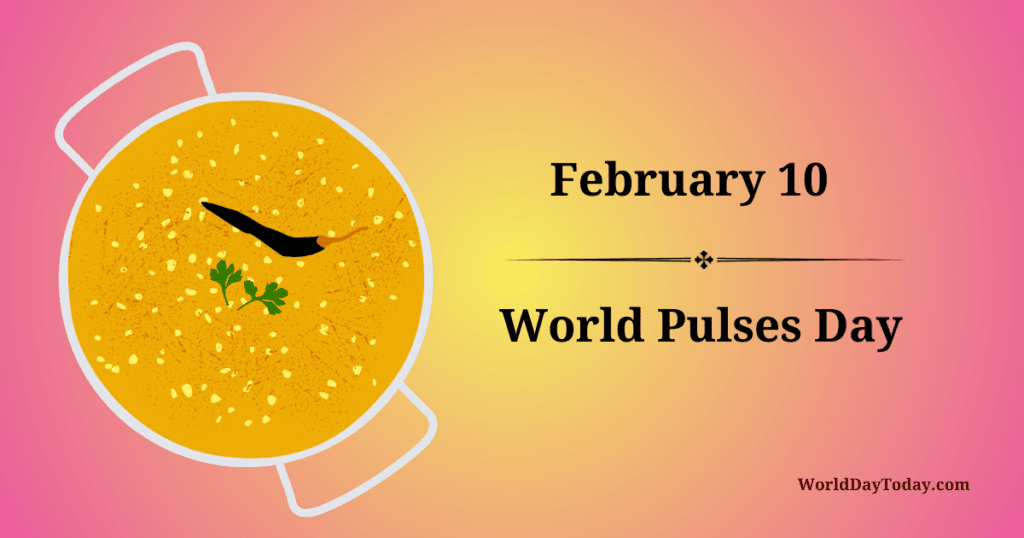10 February
World Day Today
10 February World Pulses Day
World day today

10 February World Pulses Day - Table of Content
- What Are Pulses?
- Nutritional and Health Benefits of Pulses
- Pulses and Sustainable Agriculture
- Economic Benefits of Pulses
- How to Celebrate World Pulses Day
- Conclusion
Every year on February 10, the world comes together to celebrate World Pulses Day, an international observance dedicated to promoting the benefits of pulses. Pulses, which include lentils, beans, chickpeas, and peas, are not just staple foods in many cultures but also play a significant role in food security, nutrition, and sustainable agriculture. The United Nations designated this day in 2019 following the successful International Year of Pulses in 2016. The objective is to raise awareness about the health, economic, and environmental benefits of pulses and encourage their increased consumption and production.
10 February World Pulses Day
What Are Pulses?
Pulses belong to the legume family and refer to edible seeds harvested from pod-bearing plants. Some of the most common pulses include:
- Lentils (green, brown, red, and yellow)
- Chickpeas (also known as garbanzo beans)
- Beans (black beans, kidney beans, pinto beans, navy beans, etc.)
- Peas (split peas, black-eyed peas, etc.)
Pulses are distinct from other legumes because they are harvested solely for their dry seeds, unlike soybeans or peanuts, which are used for oil extraction or animal feed.
10 February World Pulses Day
Nutritional and Health Benefits of Pulses
- High in Protein – Pulses are an excellent plant-based protein source, making them ideal for vegetarians and vegans.
- Rich in Fiber – They aid digestion, promote gut health, and help regulate blood sugar levels.
- Packed with Essential Nutrients – Pulses contain iron, potassium, magnesium, and folate, essential for overall well-being.
- Heart-Healthy – Their low fat and cholesterol content contribute to heart health by reducing the risk of cardiovascular diseases.
- Weight Management – Pulses keep you full for longer, reducing overeating and supporting weight loss efforts.
- Diabetes-Friendly – Their low glycemic index helps in controlling blood sugar levels.
10 February World Pulses Day
Pulses and Sustainable Agriculture
Pulses are not just beneficial to human health; they are also crucial for sustainable agriculture and environmental conservation. Some of their contributions in
- Improving Soil Fertility
Pulses have the unique ability to fix nitrogen in the soil, reducing the need for synthetic fertilizers. This enhances soil fertility and promotes sustainable farming practices.
- Water Efficiency
Compared to other protein sources like meat, pulses require significantly less water to grow. This makes them a sustainable choice, particularly in regions facing water scarcity.
- Lower Carbon Footprint
The production of pulses emits fewer greenhouse gases than meat production, making them an environmentally friendly dietary choice.
- Crop Diversification and Food Security
Since pulses are adaptable to different climatic conditions, they help diversify crops, improve food security, and provide a stable source of income for farmers
10 February World Pulses Day
Economic Benefits of Pulses
Pulses play a crucial role in the global economy, particularly in developing countries where they serve as a major source of nutrition and livelihood. Some key economic aspects include:
- Affordable Protein Source – Pulses provide an inexpensive source of high-quality protein, reducing dependency on costly animal-based protein.
- Boosting Farmers’ Income – Many small-scale farmers rely on pulses as a cash crop, ensuring economic stability in rural areas.
- Reducing Food Import Costs – Promoting local pulse production reduces dependence on imported protein sources, strengthening food security and self-sufficiency.
10 February World Pulses Day
How to Celebrate World Pulses Day
Individuals, organizations, and governments can celebrate World Pulses Day in several ways:
- Cooking with Pulses – Prepare and enjoy pulse-based dishes such as lentil soup, hummus, bean salads, or dal.
- Educational Campaigns – Schools and community centers can organize awareness programs on the health and environmental benefits of pulses.
- Support Local Farmers – Purchase pulses from local markets to support small-scale farmers and sustainable agriculture.
- Social Media Engagement – Use hashtags like #WorldDayToday #WorldPulsesDay and #LovePulses to spread awareness online.
- Policy Advocacy – Encourage policymakers to invest in research, production, and marketing of pulses to ensure food security.
10 February World Pulses Day
Conclusion
World Pulses Day is a vital reminder of the importance of pulses in achieving global food security, promoting sustainable agriculture, and improving public health. As the world faces challenges like climate change, malnutrition, and food scarcity, pulses provide a sustainable solution. By incorporating pulses into our daily diet and supporting their production, we can contribute to a healthier, more sustainable future for everyone. So, this February 10, let’s celebrate the power of pulses and make them a key part of our lives!